Only $99 for a full year!
No credit card required
Rank on Google's first page in 3 months
Top Content Audit Tools and Tips for Successful Content Strategy
Nov 27, 2024 | prashant@growth.cxIn the online world, where content is king, the importance of a well-crafted content strategy cannot be overstated. However, even the most thoroughly planned content can fall short of its intended impact if not regularly audited and optimized.
That’s where content audits come in, look at these stats,
- There are 54% of marketers who conduct content audits at least twice a year.
- According to 53% of marketers who update their content, engagement increases and rankings and traffic increase by 49%.
A content audit is not just a routine check-up; it’s a thorough analysis and evaluation of all your brand’s content.
By thoroughly checking your content, you can find valuable pieces, spot areas to improve, and align your content strategy with your business goals. Whether you want to improve SEO, engage users better, or increase conversions, a complete content audit is your guide to success.
So, you have to know the proper techniques, and there are a lot of content audit tools you can use to ensure your content is audited.
In this blog, we’ll explore effective content auditing techniques and introduce you to the top 10 content audit tools that can help you achieve your content marketing objectives.
What is a Content Audit?
A content audit is a process that evaluates all the content in a website. This helps in assessing the performance, relevance and alignment with business goals. In content auditing it includes analyzing blog posts, website landing pages, videos, images and other content formats. The main goal of the content audit is to identify what needs improvement and what can be retired to optimize your content strategy.
How to Run a Content Audit?
Evaluating and optimizing content regularly ensures your content drives value and aligns with your brand’s goals. This is where effective content auditing techniques come into play.
This section covers several basic techniques to help you maximize your content audit’s effectiveness.
i. Set Clear Goals and Metrics
Start with a clear objective. Ask yourself, why are you conducting this audit?
Whether it is to boost your SEO, engage your users, or ensure accurate information, you need a clear goal. It could enhance SEO, improve user engagement, or ensure the accuracy of information.
Also, define what success looks like with specific metrics, such as increased traffic, lower bounce rates, or higher conversion rates.
ii. Inventory Your Content
Create a comprehensive inventory of your website’s content. This includes articles, blog posts, videos, and other resources. A thorough inventory gives you a bird’s-eye view of what you have, making it easier to assess and strategize.
Here’s a content inventory template created by our experts for you.
iii. Evaluate Content Quality
Examine each piece for its quality. Is the information accurate and up-to-date? Does it align with your brand’s voice? Does it resonate with your target audience?
Consider readability and engagement factors. High-quality content is not just about being informative but also about being digestible and exciting to your audience.
iv. Analyze User Engagement
Utilize content analysis tools to understand how your audience interacts with your content. Metrics like page views, time spent on each page, and social shares can provide insights into what works and what doesn’t. This step is crucial for aligning your content with user preferences and behaviors.
v. Check for SEO Optimization
Ensure that your website content has been optimized for search engines. Ask yourself the following.
- Are you using relevant keywords effectively?
- Do your pages have appropriate meta descriptions and title tags?
- What’s the keyword density?
- Have I done enough interlinks?
- And so on…
Maintaining up-to-date knowledge of the latest SEO practices is vital for online visibility in a competitive market.
vi. Identify Content Gaps and Opportunities
Look for topics or areas your content needs to cover. This content gap analysis can guide your future content strategy, helping you address your audience’s unmet needs and stay ahead of competitors.
vii. Create an Action Plan
Based on your findings, develop a plan of action. Decide whether content needs to be updated, rewritten, or removed. Set realistic deadlines for completing tasks and prioritize them according to their potential impact.
viii. Implement Changes and Monitor Results
Start making the necessary changes and closely monitor the impact. This could involve updating outdated content, improving SEO elements, or creating new content. After implementation, track the performance to see if it aligns with your goals.
ix. Regularly Update Your Content Audit
Content auditing is not a one-off task. There is constant change in this digital space, and your content should reflect this. Regular audits, perhaps annually, can ensure your content stays relevant and practical.
Now that we’ve covered some content auditing techniques, let’s look at highly effective tools to simplify and improve your auditing.
Top 10 Content Audit Tools
Selecting the right tools is vital to conducting your content audits efficiently and effectively. These content audit tools can help you streamline your process, providing insights into your content’s performance and identifying gaps and areas for improvement.
| Content Audit Tool Name | Key Features | Pricing |
|---|---|---|
| SuiteJar | Content Optimizer, Content Calendar Generator, Easy Web Analytics | $29 per month |
| SEMrush | Content Analyzer, On Page SEO Checker, Competitor Analysis | $139 per month |
| Ahrefs | Site Explorer, Content Gap Analysis, Backlink checker | $129 per month |
| Screaming Frog SEO Spider | Fast Crawling and Analysis, Metadata and Content Analysis, XML Sitemap Generation | $259 per year |
| Moz pro | Keyword Research, Site Audit, Link Explorer | $39 per month |
| BuzzSumo | Content Discovery, Competitor Intelligence, Performance Tracking | $199 per month |
| Content King | Real time SEO Monitoring, SEO Alerting, Insights & Reporting | $39 per month |
| Grammarly | Grammar and Spell Check, Plagiarism Detection, Tone and Clarity | $12 per month |
| Hemingway | Readability Analysis, Highlighting Complex Sentences, Vocabulary Suggestions | $12 per month |
| Ubersuggest | Keyword Research, Content Ideas, Site Audit | $11 per month |
This section will introduce the top 10 content audit tools to help you elevate your content strategy to the next level.
Let’s go
1. SuiteJar

SuiteJar stands out as the top choice for your content auditing needs. With this tool, you can conduct an in-depth content audit that will enhance your online marketing strategies. The tool provides features like Content Optimizer, Easy Web Analytics and an AI Driven Content Calendar Generator making it easy to optimize and enhance your content.
With the Content Optimizer feature, you can find out which pages on a website have the highest chance of ranking. It provides actionable insights into how to rank them on page one.
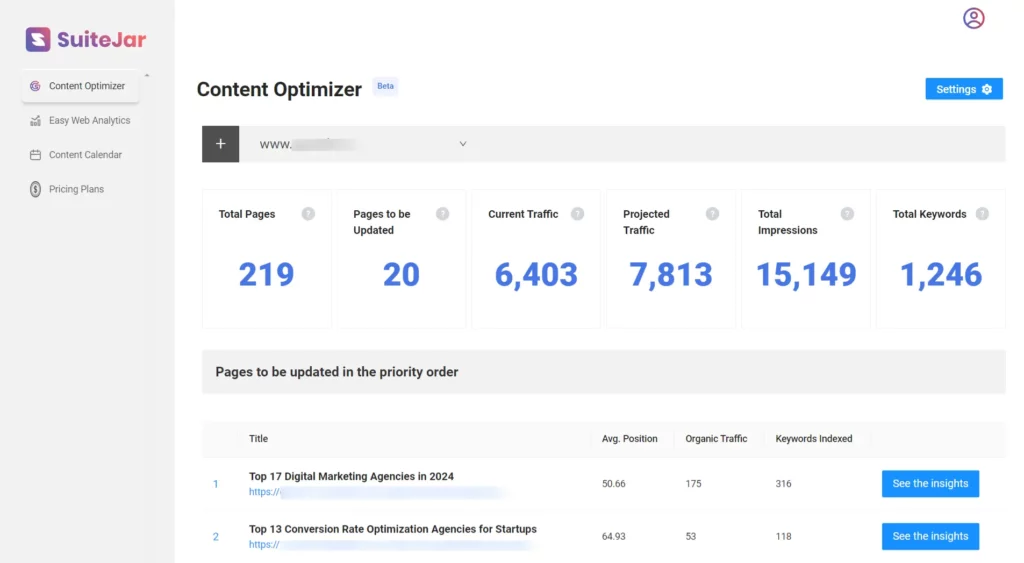
Keeping your content up-to-date is easy with outdated page content features. You can then delete or update old content on your site quickly. Then, you can keep your website relevant and up-to-date.
Also, the feature gave you the ‘see the insights’ option, where you can see what problems exist on that page and what you need to solve. In this way, you can easily take the measures to make your page first in the Google SERPs.
Key Features
- Easy Web Analytics: Using this feature, you can collect all your critical data from GA4 and visualize it in one place. You can analyze website data and develop strategies for improving the performance of your website.
- AI Driven Content Calendar Generator: Use this AI content calendar generator for effortless, customized content planning. You can input your website details to receive keyword topic suggestions and simplify your content marketing strategy.
- Website Auditor: It can be used to analyze the performance of your website and identify errors. And determine what needs to be optimized to increase the effectiveness of your website.
SuiteJar Pricing

The starting price is $29 monthly, giving you a seven-day free trial.
2. SEMrush
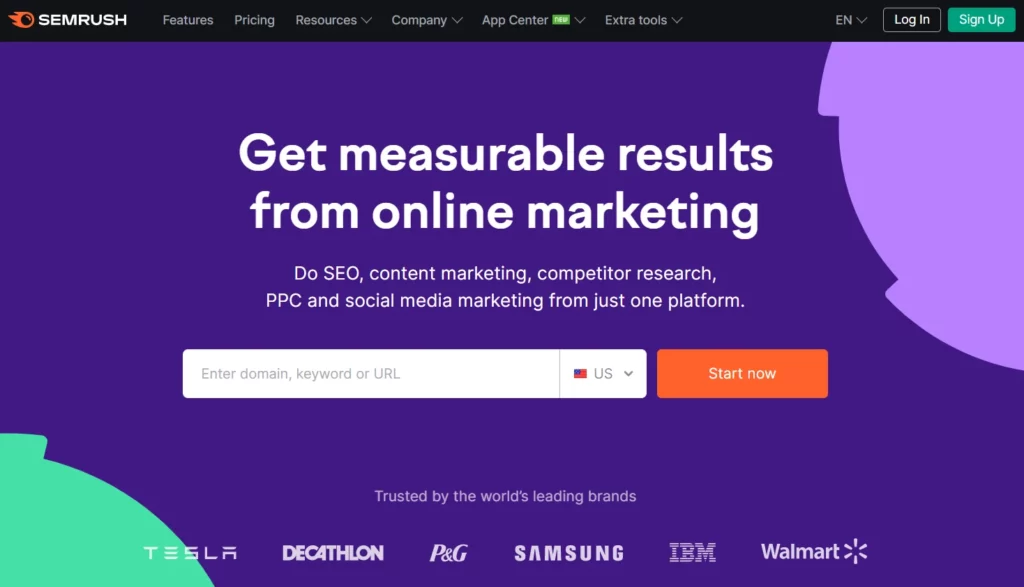
SEMrush is another tool that identifies and assesses the performance of your content with SEO. It offers valuable insights on critical areas such as duplicate content, broken links, and keyword optimization. With SEMrush, you can effortlessly diagnose issues in your content strategy and create solutions to enhance your online visibility.
Key Features
- Content Analyzer: This feature provides an in-depth analysis of your content’s performance across various platforms. It gives you a comprehensive view of your content’s effectiveness, like backlinks and Google rankings.
- On-Page SEO Checker: This tool assists in optimizing your content for search engines by providing tailored recommendations for meta titles, H1 tags, and content length.
- Competitor Analysis: Improve your website traffic and performance by examining the winning strategies of your competitors.
SEMrush Pricing

Pricing begins at $139 per month, and other packages are also available.
SEMrush may be a little pricey compared to other tools, so read this blog to learn about the best alternatives to SEMrush.
3. Ahrefs

Ahrefs is an all-in-one SEO tool that offers a comprehensive content audit feature. This tool is renowned for its extensive index of backlinks, making it a go-to resource for thorough content audit and backlink analysis.
Key Features
- Site Explorer: It shows how well your website is doing in search engines, giving details on organic search traffic. It also reveals your top keywords and most popular pages.
- Content Gap Analysis: This feature helps uncover the keywords where your competitors are ranking well, but your website needs to be. You can pinpoint chances to develop relevant content that addresses these gaps, potentially boosting your online visibility.
- Backlink Checker: This backlink checker feature lets you examine your site’s backlink profile, keeping tabs on new and lost backlinks while evaluating their quality. This tool is essential for understanding your backlink profile’s impact on your SEO performance.
Pricing

The Ahrefs pricing plan starts at $129, and there are additional packages such as standard, advanced, and enterprise.
Also read: Best Free & Paid Ahref’s Alternatives
4. Screaming Frog SEO Spider
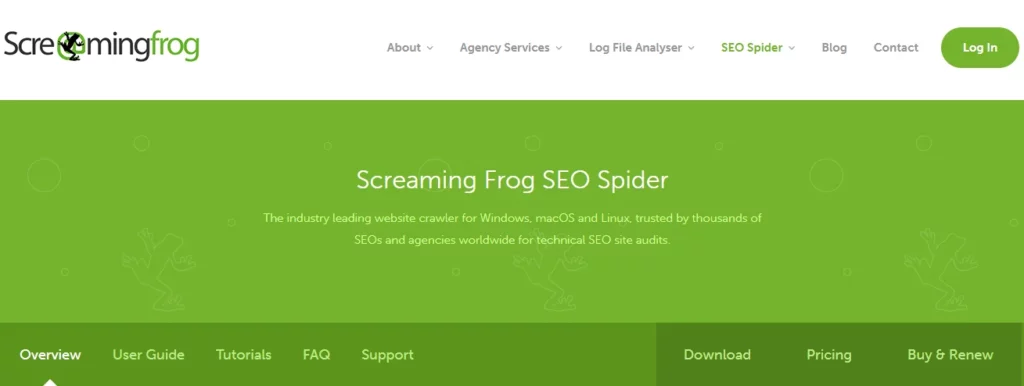
Screaming Frog SEO Spider is known for quickly crawling websites and collecting vital data. It effectively spots broken links, examines page titles and metadata, and creates XML sitemaps—This tool is mainly for discovering and categorizing URLs on your website to identify and manage issues and opportunities related to different templates, page types, or site sections more effectively.
Key Features
- Fast Crawling and Analysis: You can stand out for its ability to quickly crawl websites and gather critical data. This feature makes it an excellent choice for those who need to perform regular, comprehensive website audits.
- Metadata and Content Analysis: It helps identify missing or duplicated metadata and lengthy titles. Easy to locate keyword misuse in content, improving your on-page SEO.
- XML Sitemap Generation: The tool can generate XML sitemaps, which ensure search engines can crawl and index your website effectively. Identifying and fixing any issues in your sitemap can improve your website’s visibility in search engine results.
Screaming Frog SEO Spider Pricing

Pricing for Screaming Frog begins at $259 per year.
5. Moz Pro

Moz Pro is a comprehensive content auditing tool designed to optimize your SEO strategy. It offers tools that analyze keywords, track rankings, and audit your site for potential SEO issues. It gives detailed insights into your site’s performance and has strong keyword research abilities.
Key Features
- Keyword Research: This keyword research tool enables you to find and focus on impactful keywords for your content. It monitors how your keywords rank, giving you insights into how well your site performs in search engine results.
- Site Audit: Moz Pro performs a comprehensive site audit to identify any potential SEO issues. It highlights problematic areas such as broken links, duplicate content, and slow-loading pages. And provide actionable recommendations to improve your site’s SEO health.
- Link Explorer: Link Explorer provides data on your site’s backlink profile. Identify who’s linking to your content and what they’re linking to, and compare your link profile with competitors.
Pricing

The starting price of the tool is $39, and other packages are also available. And try this blog if you’re looking for Moz competitors.
6. BuzzSumo

A content auditing tool like BuzzSumo lets you see what content performs the best for any topic or competitor. Discover your competitors’ content strategy, track your performance, and discover high-performing keywords. This platform helps you better understand your audience’s interests so you can create more targeted content.
Key Features
- Content Discovery: You can uncover trending topics in your industry with a content discovery module. With this feature, you can see what content resonates most with your audience so you can produce highly targeted and engaging content.
- Competitor Intelligence: This feature allows you to track and analyze your competitor’s content strategy. You can identify what content performs best for your competitors. Understand their content distribution strategies, and gain insights into their audience’s content preferences.
- Performance Tracking: It offers an effective performance tracking tool that allows you to monitor how your content is performing. This feature provides insights into content engagement, social shares, and overall reach.
BuzzSumo Pricing

Pricing begins at $199 per month and varies based on the package selected.
7. ContentKing
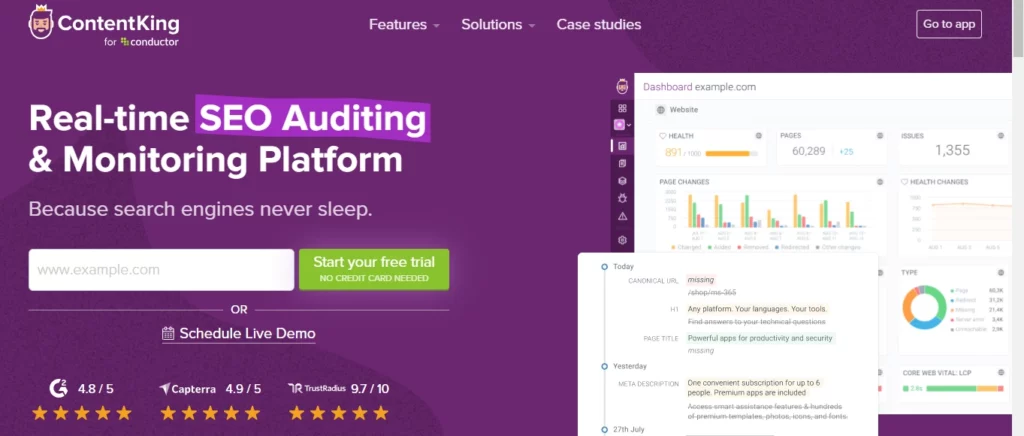
ContentKing is an SEO auditing and content optimization tool that offers insight into your website. Its core capabilities include SEO monitoring, issue tracking, and on-page SEO optimization. You can deeply understand your site’s SEO performance with its data analytics.
Key Features
- Real-Time SEO Monitoring: ContentKing lets you continuously track your website’s SEO performance. It provides real-time updates on changes, alerting you to any potential issues or opportunities for optimization.
- SEO Alerting: You will be alerted when your website experiences a problem or unexpected content changes. This allows you to resolve the issues before search engines and visitors become aware of them.
- Insights & Reporting: It collects significant data regarding your website. You can access information at your fingertips using its various insights and reporting functions.
ContentKing Pricing
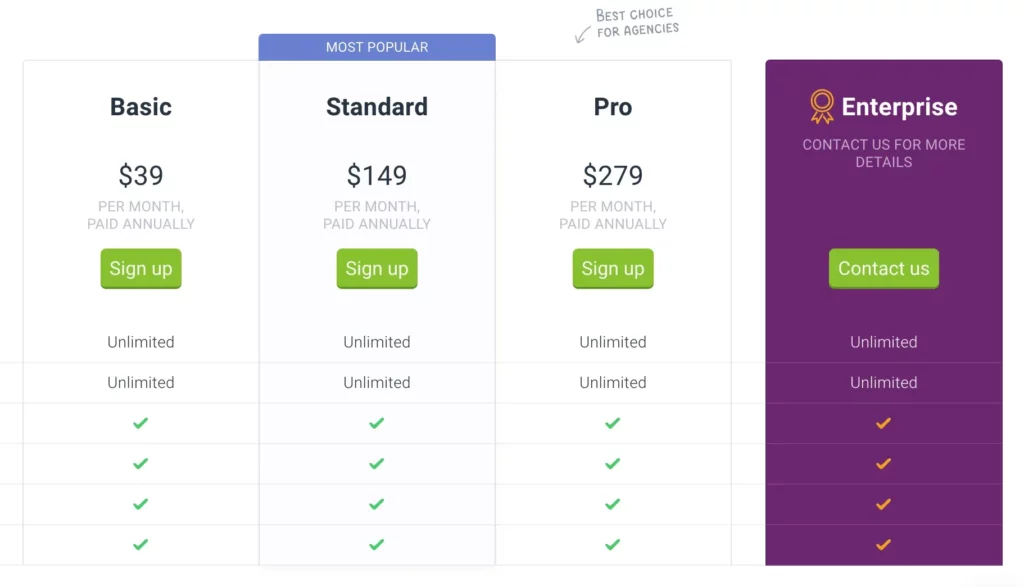
The basic package of ContentKing is available at a monthly cost of $39 and includes a standard, pro, and enterprise plan.
Further Read: Best Content Marketing Tools
8. Grammarly

Grammarly is a complete writing assistant and content auditing tool that has changed how people approach written content. Its feature includes grammar and spell-checking, providing a thorough analysis of text to enhance clarity, engagement, and overall effectiveness.
Key Features
- Grammar and Spell Check: It helps identify and correct grammatical errors and spelling mistakes in your content. Also detects issues such as subject-verb agreement, incorrect verb tenses, and common punctuation errors.
- Plagiarism Detection: Grammarly has a plagiarism detection feature that compares the text against all the web pages to identify potential matches, ensuring the content is unique.
- Tone and Clarity: It has the ability to set the tone and clarity of the content. It provides real-time feedback on how the text might be perceived by readers, suggesting adjustments to make the writing more formal, informal, or friendly.
Grammarly Pricing

Grammarly offers a free version and the premium plan with more features starts at $12 per month.
9. Hemingway
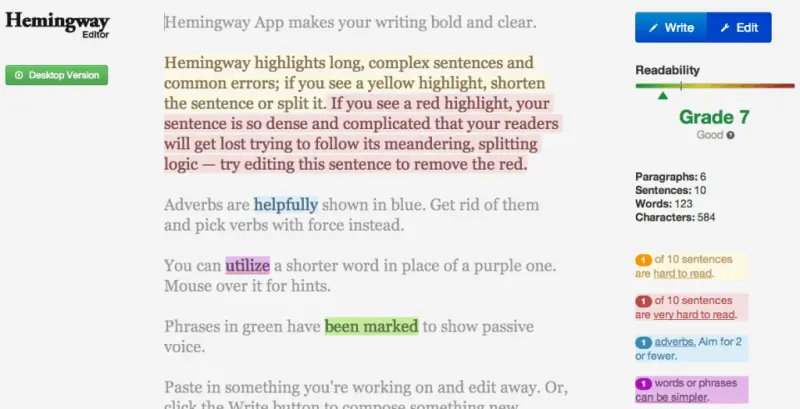
The Hemingway App Editor is a content auditing tool designed to help writers produce clear and concise text. This app highlights simplicity and readability, making it a popular resource for anyone looking to refine their writing style. You can use this for as much word-length content as possible and get valuable results.
Key Features
- Readability Analysis: The main feature of this audit tool is its readability analysis. It evaluates the text and assigns a readability grade level, which indicates how easily a reader can understand the content. The lower the grade level, the clearer and more readable.
- Highlighting Complex Sentences: The app shows yellow color highlights indicating that a sentence is hard to read, while red highlights show sentences that are very hard to read. This feedback helps writers simplify and shorten their sentences for better readability.
- Vocabulary Suggestions: It suggests simpler alternatives for complex words or phrases, which are highlighted in purple. This encourages writers to choose a specific language. This way, you can enhance the clarity and directness of their content.
Hemingway Pricing

Hemingway offers a free version with limited features and the premium plan with more features starts at $10 per month.
10. Ubersuggest
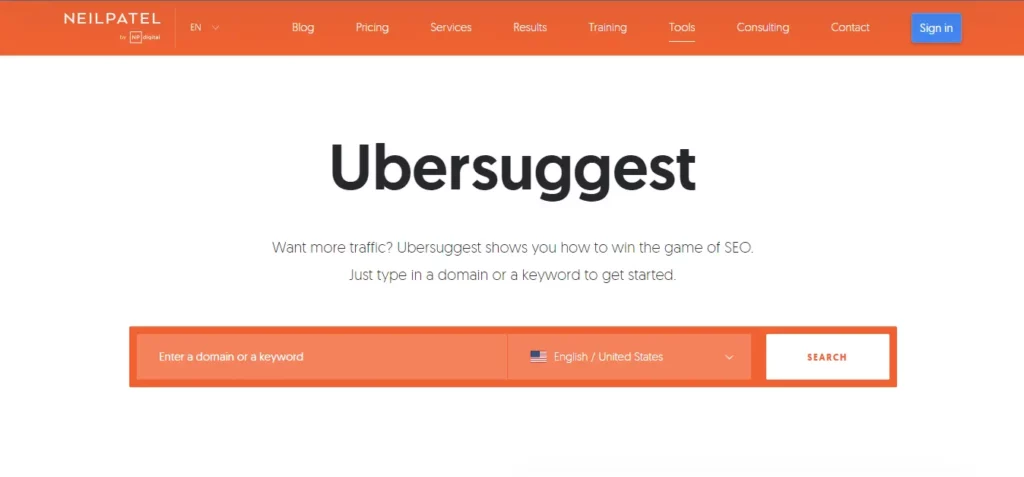
With Ubersuggest, you can audit your content and optimize your online presence with many useful features. It helps businesses enhance their online visibility by providing comprehensive insights into their website’s performance. For support with your content audit, the tool provides features like keyword research, content optimization, and competitor analysis. All of its features make it ideal for anyone aiming to improve their website content.
Key Features
- Keyword Research: It provides detailed keyword research on ideas based on search volume, competition, and trends that help you create quality website content. The tool allows users to identify the keywords to target, ensuring their content is optimized for visibility.
- Content Ideas: It helps users discover what topics are trending and what type of content resonates most with their audience. Also, it provides insights into backlinks and social shares, allowing users to understand the factors contributing to high-performing content.
- Site Audit: The site audit feature performs a thorough analysis of your website. This will identify SEO issues such as broken links, page speed, and on-page SEO errors. It comes with a detailed report with recommendations, enabling users to fix problems efficiently.
Ubersuggest Pricing

Ubersuggest pricing starts at $11 monthly, with various plans available to meet different needs. For other options, take a look at this blog, which features ubersuggest alternatives.
Conclusion
Content auditing is a strategic approach to keep your website’s content fresh, relevant, and engaging, ultimately enhancing user experience and achieving your digital marketing goals.
Here, we examined the best strategies and content auditing tools available in the industry.
Each tool offers its value proposition, providing a tailored content optimization approach. Whatever your goal, incorporating these tools will help you make better decisions and boost your online presence.
You should select the most suitable content audit tool for your website’s needs.
FAQs
1. What is a content audit tool?
A content audit tool analyzes and optimizes website content. The tool streamlines the process of assessing content quality, SEO effectiveness, and user engagement. Several popular tools, such as SuiteJar, Ahrefs, and Buzzsumo, are available for content auditing.
2. Why run a content audit?
Optimizing your online presence requires a content audit. It ensures SEO effectiveness, enhances user experience, verifies accuracy, identifies content gaps, improves conversion rates, and streamlines website performance.
3. What is content auditing in SEO?
An SEO content audit aims to optimize your content for search engines. The process involves keyword analysis, backlink analysis, on-page SEO optimization, content quality evaluation, and competitor analysis to improve search engine rankings and visibility on the Internet.
4. How do you audit your content?
A proper audit is done by using specialized content audit tools to analyze performance metrics, evaluate consistency with audience needs, ensure SEO optimization, and identify gaps or outdated information on your website.


